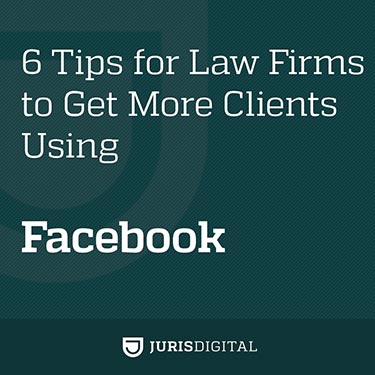Facebook traffic is growing and more people are spending time on the website and app every day. The current pandemic situation has actually inflated these numbers.
In fact, a recent study by the Wall Street Journal revealed that Facebook traffic was up over 50% since the pandemic started. Whether you love it or hate it, you can’t (and shouldn’t ignore it).
Is Facebook Advertising Effective for Lawyers?
This is one of the most common questions I get asked when attorneys are exploring whether or not they should engage with Facebook as way to generate new cases. I think now more than ever, Facebook is an effective channel to build your brand and generate new cases.
As a Law Firm SEO Expert at heart, it used to pain me to say this. But at the end of the day, you need to focus on the marketing tactics that bring the most business to your firm with the strongest ROI.
Now before you get too excited, you have to understand that it’s essential to put in the work before you see any type of return on investment on Facebook. It takes time, money, and attention to detail to make it work for your law firm.
But I tried it in the past and it didn’t work!
Most of the time, after I speak with an attorney about their past experiences with Facebook and Facebook Ads, I hear that it was a waste of money or that it didn’t work. If that’s the situation you’re in, I encourage you to ask yourself if anything below sounds like your campaign:
- I posted my blog content and it never got any pickup
- I boosted posts but never got a lead
- I ran a targeted advertising campaign to my city/ region, but didn’t get any cases!
- I shared community events my law firm did and never got any likes
Wherever you’re coming from if you think about tactics that work for inbound marketing (e.g. someone doing a Google search for your services) and apply them to Facebook, you have it wrong.
Inbound Marketing and Social Media Require Different Strategies
This is where most SEO experts get Facebook (and social media in general) wrong. If you are using the same tactics for inbound marketing (where the client already knows what they want) to an audience who isn’t actively looking for you, you’re doing it wrong.
Think about it. Do you go to Facebook and look for someone to mow your lawn? If you do it’s your neighbor. If you want to buy something it’s the Facebook marketplace.
The fact is though, that as an attorney if someone is “looking” for you on Facebook, then they are asking their friends or family on their timeline or asking for recommendations in a group. They are not typically going to the search bar and typing “best personal injury lawyer”.
And if they’re not looking for you – a general brand message that shows the services you offer, targeted towards people who don’t need you probably won’t be very effective.
People Have Problems & Seek Solutions From Experts
Generally speaking, if someone needs to hire an attorney they either have a problem or a future concern. Both of these are pain points that speak to your potential client.
One commonly overlooked strategy of effective social media promotion is giving away information. If you want to establish yourself as a true expert and stand out from your competitors, using social media to give away free information is a great way to start.
For some reason, many people are afraid to give away “free’ information online, even if it’s not specific.
Generally speaking, giving away information is a great way to show people you know what you’re talking about as well as establish trust that you’re the one someone should hire. When attorney’s don’t engage in this tactic, it’s typically because they’re scared of one of these things:
- If I give away the answer they won’t hire me! In my experience, the people that are going to do it themselves typically find a way anyhow. Isn’t it better to point them in the right direction rather than have them call you and string you along?
- They will steal my secrets and tell their friends! The sad fact though is that people are just too lazy to do this 99% of the time. Honestly, though, the information is already online. Why not be the best resource on the topic and have other people talk about you?
I wanted to say all of this to tell you that people have problems and you can help them by providing a solution. In the marketing world, we call these pain points and they will drive your potential clients to take action.
Six Tips for Law Firms to Get More Clients Using Facebook
Considering testing Facebook for your law firm? All the way back n 2017, Facebook was expected to capture nearly 40% of the online display advertising market. Translation: Facebook can be a powerful marketing channel for lawyers..

Online advertising is becoming more of a necessity than an option for businesses—but it’s only worth the investment when done right. As a busy lawyer, you need to know how to get started on the right foot quickly, so that you can bring in new clients without breaking the bank or investing a lot of time.
Here are six tips that can help you drive more traffic to your website via Facebook, and ultimately get more clients for your law firm.
1. Pay for Facebook Ads
Facebook advertising isn’t free. In the past, having a page for your law firm meant that your posts would organically reach at least anyone who liked your page, and potentially more Facebook users too. But as of a few years ago, organic posts from Facebook pages only reach about 2.6% of their fans.
If you decide to start a Facebook page for your law firm, don’t just post updates and hope for new leads to roll in.
Pay to boost your posts to a targeted audience so that potential customers actually see them.
2. Choose your target audience wisely
With Facebook advertising, you’ll have plenty of options to target the type of people who’ll be most interested in your services, so take advantage when setting up your campaigns. For example, if you’re a wills and estates lawyer, and you’re posting a link to a blog post entitled “Just Married? 3 Ways to Structure Your Will to Protect Your Loved Ones,” you could target:
- Engaged couples
- Newly engaged couples
- Newlywed couples
You can choose who to target with your ads based on any number of life events that people might post about on Facebook, and you can set geographic targets based on where you practice—targeting a newly engaged couple in New York when you practice in Texas won’t help your business. Take time to do this right, and your ads will be more effective.
Note: Facebook advertising may not be the best bet for all practice areas. For example, if you’re a personal injury lawyer, consider that potential clients will likely use Google, not Facebook, to find a lawyer quickly. Before spending, ask yourself, “Will potential clients see this ad when they need my services?”
3. Write an ad that doesn’t look like an ad
If you can make your ads helpful, you’ll pay less to advertise on Facebook.
Facebook uses algorithms to determine how well your ad content is received—and posts that don’t resemble an ad are usually more popular, making them cheaper for you to promote. For example, it might be more expensive to promote an ad titled “Looking For a Divorce Lawyer?” than to promote a link to a blog post or video titled “5 Things To Do If You’re Considering Divorce.” Which brings us to our next point.
4. Create helpful content with a purpose
The best way to collect leads from Facebook is to first drive visitors to your website. And the best way to keep visitors on your website is to provide helpful, engaging content.
Give as much information as you can, and provide it in a format that is helpful and actionable. For example, family law firm Fresh Legal has written an extremely useful post on the first steps to take after a separation.
As a bonus, this type of content helps position you as a subject matter expert and builds trust with potential clients. They’ll be much more likely to remember your name when they’re ready to hire a lawyer if you’ve helped them already. Useful informational content can also help with SEO, as this post from Juris Digital explains.
5. Create a video if you can
Blog posts are just one form of content you can create for your website. Other options, like infographics, slideshares, or videos, can also be effective for driving visitors to your website.
If you’re advertising on Facebook, uploading a short video rather than a blog post can make a big difference in terms of engagement. Why? Four times more consumers would prefer to watch a video than read an article, and with Facebook’s autoplay feature, videos are extra eye catching.
When creating videos, keep them short, and include captions so that viewers can watch your videos without sound—over half of Facebook’s users access the site via mobile, and they may be in a situation where they can’t turn their sound on (e.g., on a train or bus).
6. Test, test, and try again
When it comes to Facebook advertising, don’t just set it and forget it. Try different headlines and different versions of ads to see which are most effective for your firm. For example, if you’re boosting a blog post or video, does a title in the form of a question work better, or a title in the form of a list?
You can see how your ads are performing in the Facebook Ads Manager, under the “Ad Reporting” screen. If your ad is bringing in plenty of clicks, you may want to run it a little longer, or run a similar campaign. If not, it might make sense to try something different for your next ad.
If you’d like to learn more about setting up Facebook advertising campaigns for your law firm, check out this guide to Facebook advertising campaigns from Clio.
Should You Use Facebook?
If your law firm has the budget, time, and resources to test Facebook advertising it’s a no brainer. For the most part, just don’t expect results overnight. You have to put in the time, effort, and be willing to look at the data.
The firms that are the most successful with Facebook advertising take this approach.
